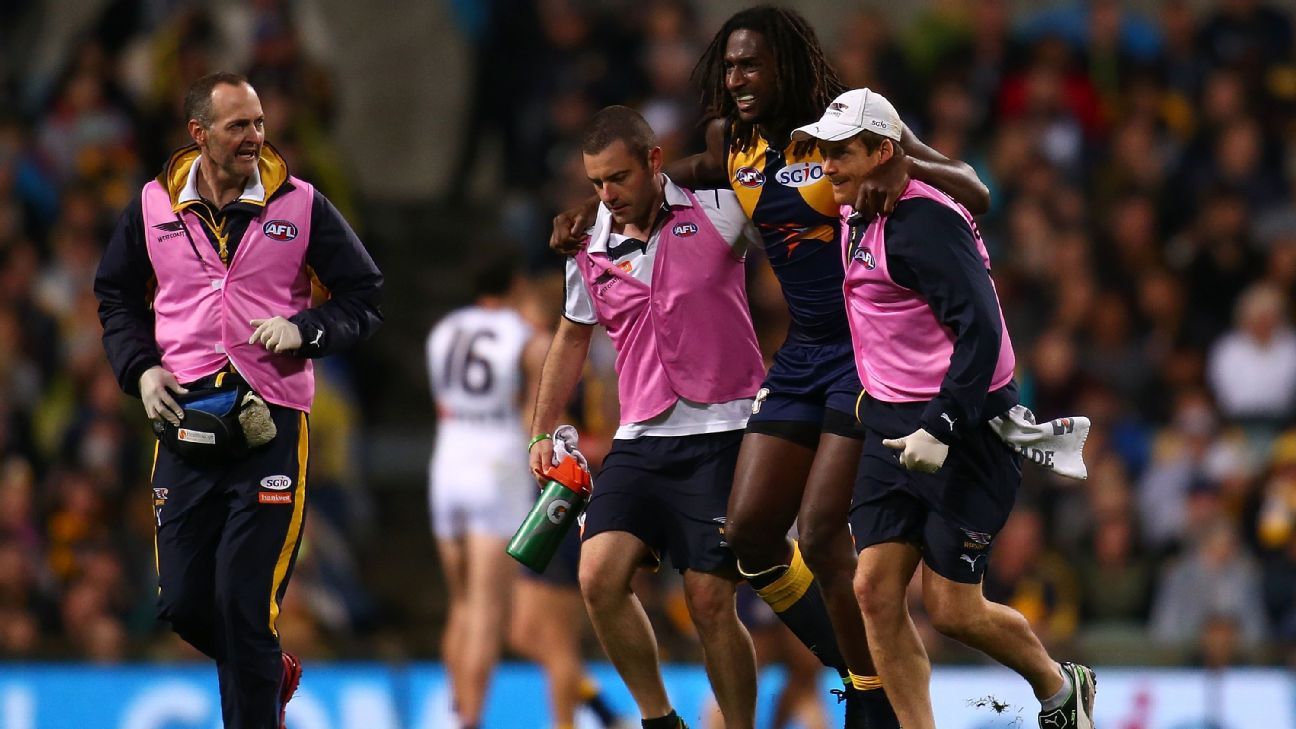Who can forget the look on Nic Naitanui’s face when he ruptured his ACL in 2016. Absolutely devastated. He worked so hard on his rehab and made his return to football only to then repeat the injury on his other knee.

There is no doubt about it that injuries can be traumatic and they can be devastating, not just at an elite level. Injuries can cause major disruptions to our everyday life. They can force us to have time off work or mean we can’t do our usual work duties, they can make every day tasks such as getting out of bed or getting dressed extremely difficult and quite often they have a big impact on our independence. Not being able to drive or requiring help for basic tasks can be very frustrating.
The psychological impact of injury can range from mild mood changes (such as irritability), anger, lack of motivation and low self-esteem to a range of mental health changes such as anxiety, depression and panic attacks.
So regardless of the extent or circumstances of your injury here are some tips to help keep your mind healthy while you are recovering:
1. Learn about your injury – and not from Dr Google!
One of the reported mental/emotional effects from injury is the feeling of a loss of control. The best way to keep feeling in control of your injury is to learn about it. However do not go to the extreme of ‘Google’ing every little piece of information you can find! For starters there is always information about the worst case scenarios which can end up blowing things way out of proportion, driving you crazy and actually having a detrimental effect on your recovery. Remember that response to injury is an individual thing so by seeing a professional and having a proper assessment done you can be provided with the most up-to-date information specific to your situation. This also leads into the next tip.
2. Accept Responsibility and Take Control
Now I am 100% NOT saying that your injury is your fault! This is talking about recognising and accepting that you have an injury and being proactive about your recovery. This can be easier said than done, particularly when your injury occurred in a situation that was purely out of your control. It is easier to blame someone else or the situation for what happened. However this can just fuel the negative emotional responses to injury such as anger and depression. Take control of your injury by putting the responsibility into your own hands. No one can have a bigger impact on your injury than you, so do everything you can to make it a positive one.
3. Keep Active
We know the proven physical and mental benefits of exercise and so it is imperative to try and keep yourself moving as best as you can. In a sports situation this can be even more important as you want to maintain your fitness and skills. Where possible continue to train and exercise around your injury. If your injury stops you from running you might be able to bike ride or swim as these take gravity out of the equation and produce less stress through the legs. If you have a lower body injury you can still train your upper body with weights, even in a sitting position if needed. If you have an arm injury that means you can’t lift things – hammer out those body weight exercises such as squats and lunges. You just have to be a bit creative and of course if you aren’t sure of what you can be doing, come and ask us!

4. Get Support and Don’t be Afraid to ask for help
It is okay to ask for help. Everybody needs help throughout their lives and there is absolutely no shame in it. Talk to people about what you need and they will most likely be more than happy to help you.
5. Keep Doing Life as Normally as possible
Having an injury tends to make people want to withdraw from different aspects of their lives for various reasons. Remember I mentioned before about the lack of motivation? Sometimes injuries make you feel like you just can’t be bothered! It can also be fear, maybe of making things worse or that you just can’t do things. I think you are under estimating yourself! The human body (and mind for that matter) as unbelievably resilient and designed to overcome challenges. Don’t let your injury stop you doing the things you love, they might just need some modification. This also comes back to the point of being in control. Don’t let your injury consume your life. If there is something you would normally do (eg. daily chores, going out with your friends or even just moving about the house) then keep doing it!!
6. Use Your Mind to help heal your body
There are several strategies that have been proven to help with mental health during injuries and can actually even help with healing process. These include things like:
- Imagery – it has been shown that picturing yourself being healthy, your injury healing and you performing tasks as normal can be extremely helpful in recovery
- Meditation and Mindfulness – are extremely beneficial for resilience and positivity. This can be done in a variety of ways but a few ideas including using mindfulness apps such as Headspace or Smiling Mind, getting outdoors, keeping active and continuing to engage in activities that you enjoy
- Set goals in your recovery – this helps you to see that you are getting better and continuing to move forward. Start with small and achievable goals

7. Stay Connected
Injuries can sometimes cause us to feel isolated from various parts of our normal lives and so it is important to stay connected. Some examples of this are:
- Work – remaining involved in work is a positive indicator for recovery as it ties in with keeping things as “normal” as possible. If you are unable to be at work perhaps you are able to work from home? Your workplace may be able to accommodate alternate duties for you or reduced hours if this would help. However if your injury results in you having to take time off do not beat yourself up about it, take this time to focus on your recovery and you will be back before you know it!
- Social – spending time with friends and family is vital for our mental health so do not give this up! Make time with them for the things you would normally do or find alternatives. Keep talking with them and being honest about what you can/can’t do and they will only be supportive of this
- Sport – having time off from sport because of injury can be extremely hard so stay involved where you can. Head down to watch your team play, ask your coach if there is anything you can do to help at training, run water, help move equipment or just be there for moral support. Your team will appreciate it and you won’t feel as though you are completely missing out
Coping with injury can be tough but by putting these strategies in place you are maximising your recovery and it will make everything seem much less scary. Remember that you are in control of your injury but we are always here to help.
Allissa King
Physiotherapist


